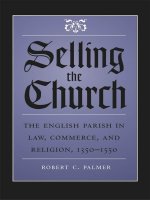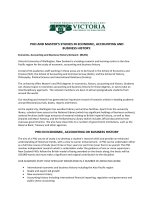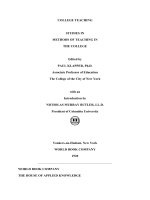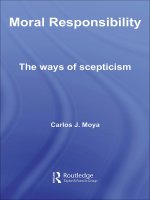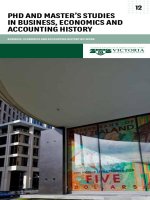CAMBRIDGE STUDIES IN ENGLISH LEGAL HISTORY ROMAN CANON LAW IN REFORMATION ENGLAND pot
Bạn đang xem bản rút gọn của tài liệu. Xem và tải ngay bản đầy đủ của tài liệu tại đây (5.2 MB, 233 trang )
CAMBRIDGE STUDIES
IN ENGLISH LEGAL HISTORY
ROMAN CANON LAW
IN REFORMATION ENGLAND
In this book one of the world's foremost legal historians draws upon the
evidence of the canon law, court records and the English common-law system
to demonstrate the extent to which, contrary to received wisdom, Roman
canon law survived in England after the upheavals of the Protestant
Reformation.
R. H. Helmholz provides an extensive examination of the manuscript
records of the ecclesiastical courts and professional literature of the English
civilians. Rebutting the views of Maitland and others, he shows how the
lawyers in English ecclesiastical courts continued to look to the writers of the
Continent for guidance and authority in administering the system of justice
they had inherited from the Middle Ages. Intellectual links between England
and the Continent are shown to have survived the Reformation and the
abolition of papal jurisdiction. The extent to which papal material was still
used in England during the sixteenth and seventeenth centuries will interest
all readers and surprise many.
Clearly and elegantly written, this book is both a companion to and
development of Maitland's celebrated Roman Canon Law in Medieval
England.
It will be of great interest not only to legal and ecclesiastical
specialists but to any reader seeking a wider understanding of the consti-
tutional and intellectual context in which the English Reformation developed.
R. H. HELMHOLZ is Ruth Wyatt Rosenson Professor of Law at the
University of Chicago. His previous publications include Marriage Litigation
in
Medieval
England,
also published (1975) in Cambridge Studies in English
Legal History.
CAMBRIDGE STUDIES
IN ENGLISH LEGAL HISTORY
Edited by
J. H. BAKER
Fellow ofSt Catharine's
College,
Cambridge
The Law of Treason in England
in the Later Middle Ages
J. G. BELLAMY
Marriage Litigation in Medieval England
R. H. HELMHOLZ
The Common Lawyers of Pre-Reformation England
Thomas Kebell: A Case Study
E.
W.IVES
William Sheppard, Cromwell's Law Reformer
NANCYL.MATTHEWS
The English Judiciary in the Age of Glanvill and Bracton,
c.1176-1239
RALPH V. TURNER
Pettyfoggers and Vipers of the Commonwealth: The 'Lower Branch'
of the Legal Profession in Early Modern England
C.
W. BROOKS
Sir William Scott, Lord Stowell
HENRY J. BOURGUIGNON
Sir Henry Maine: A Study
in Victorian Jurisprudence
R. C. J. COCKS
ROMAN CANON LAW
IN REFORMATION
ENGLAND
R.
H.
HELMHOLZ
Ruth Wyatt
Rosenson Professor
in
the University of Chicago
CAMBRIDGE
UNIVERSITY PRESS
PUBLISHED BY THE PRESS SYNDICATE OF THE UNIVERSITY OF CAMBRIDGE
The Pitt Building, Trumpington Street, Cambridge, United Kingdom
CAMBRIDGE UNIVERSITY PRESS
The Edinburgh Building, Cambridge CB2 2RU, UK
40 West 20th Street, New York NY 10011-4211, USA
477 Williamstown Road, Port Melbourne, VIC 3207, Australia
Ruiz de Alarcon 13, 28014 Madrid, Spain
Dock House, The Waterfront, Cape Town
8001,
South Africa
© Cambridge University Press 1990
This book is in copyright. Subject to statutory exception
and to the provisions of relevant collective licensing agreements,
no reproduction of any part may take place without
the written permission of Cambridge University Press.
First published 1990
Reprinted 1994
First paperback edition 2004
A catalogue record for this book is available from the British Library
Library of Congress Cataloguing
in
Publication data
Helmholz, R. H.
Roman canon law in Reformation England / by R. H. Helmholz.
Expanded and revised version of the Maitland lectures, delivered
in Cambridge during the Lent term of 1987 -
Pref.
Includes index.
1.
Ecclesiastical law - Great Britain - History. 2. Canon law - History.
I. Title.
KD8605.H45 1990
262.9'0942'09031-dc20 89-35785 CIP
ISBN 0 521381916 hardback
ISBN 0 52152605
1
paperback
Transferred to digital printing 2004
CONTENTS
rrejace
List of abbreviations
Table of statutes
Table of cases
THE MEDIEVAL INHERITANCE
English ecclesiastical law and the papal law books
Canon law and medieval English common law
THE FORTUNES OF ECCLESIASTICAL
JURISDICTION
The early Tudor years
The middle years of the sixteenth century
The reigns of Elizabeth and James I
DEVELOPMENTS IN LAW AND LEGAL
PRACTICE
Defamation
Marriage and divorce
Testaments and probate
Tithes
Ex officio proceedings
Conclusions
THE LITERATURE OF CIVILIAN
PRACTICE
Proctors' books
Advocates' treatises
Ecclesiastical reports
Opinions of counsel
General characteristics of civilian literature
Sources of knowledge of Roman canon law
Conclusion
page vn
X
xiii
xvi
1
4
20
28
30
34
41
55
56
69
79
89
104
119
121
124
131
137
142
144
149
154
vi Contents
5 THE CIVILIANS AND ENGLISH COMMON
LAW 158
Civilians and English statutes 159
Civilians and the common law courts 171
Conclusion 194
Appendix 1: Manuscript copies ofClerke's Praxis 196
Appendix 2: Ecclesiastical reports, 1580-1640 198
Index 200
PREFACE
The pages which follow attempt to describe the history of the canon
law and the ecclesiastical courts in England during the era of the
Reformation. That 'era' is here taken in an extended sense, as embrac-
ing the reigns of all the Tudor monarchs together with that of James I,
or from 1485 to 1625. This choice of dates was dictated in the first
instance by a desire to tell a fuller story than would be possible by
concentrating simply on the years when ties between England and the
papacy were cut, and also by a belief that the causes and consequences
of constitutional change would be more fairly seen over the course of
a
longer period. Luckily, later research justified the choice. The evi-
dence shows that this part of the history of ecclesiastical jurisdiction in
England cannot be adequately described by concentrating on a few
years or upon a single event.
Behind the description found in these pages lies a continuing
investigation of the records of the ecclesiastical courts. By the six-
teenth century these records survive in great profusion for virtually
every English diocese and archdeaconry. I doubt that anyone can do
more than sample this vast store. Certainly that is all I have done. The
book is also based, however, on a preliminary examination of another
kind of legal literature. It consists of a surprisingly large number of
manuscript works written for and used in actual practice by the
English civilians, the advocates and proctors who staffed the spiritual
tribunals. This 'working literature', described in Chapter 4, permits a
more complete look at the substance of the law enforced in the
ecclesiastical courts than that afforded by the records alone. It has
provided the most surprises and has changed my way of thinking
about the legal history of the period in several ways.
This book is an expanded and revised version of the Maitland
Lectures, delivered in Cambridge during the Lent term of 1987. The
title of Maitland's famous work, Roman Canon Law in the Church of
viii
Preface
England, was the obvious source of my own. Probably this was
presumptuous on my part, and my original intention was to change
the title when I came to commit my findings to print. However,
working further on the subject made the title seem all but inevitable.
For one thing, it was Maitland who established that the study of the
canon law was an essential part of English legal history. It was he who
most trenchantly raised many of the themes touched upon by my
research. Though I have diverged from his steps in several places, it is
his path that I have followed and attempted to enlarge. Also, and
probably more important, this book deals primarily with the subject
best expressed by his title. The history of ecclesiastical jurisdiction
during the Reformation era turns out to revolve mostly around the
Roman canon law. Its resilience, its vast store of resources, and the
pressures put upon it during this era, furnish the central themes of
this study.
In one further respect, the Lectures and now the book track the
path Maitland laid out. In dealing with this then controversial sub-
ject, the great historian cautioned, 'Let us, as far as may be, stick to
our legal last.'
1
I have tried to take Maitland's words as my invariable
guide. Much beyond legal history can be made of the ecclesiastical
court records. Social, religious, and even economic historians have
found them useful. I have none the less stuck to their legal side, and
the story told here may well be thought incomplete on that account.
On the other hand, it is important that someone deal with the legal
issues. The ecclesiastical courts were courts of law. They did not
simply enforce the political or religious preferences of the men who
happened to hold office within them at any particular time. Concen-
tration on legal aspects of their history has costs, but it also provides
an essential part of their history.
There remains the pleasant task of thanking the many people who
have helped me. To the Managers of the Maitland Memorial Fund,
and in particular to Professors S. F. C. Milsom and J. H. Baker, I am
deeply grateful for the invitation which led to this book. To the
Master and Fellows of Trinity College, and especially to its Vice-
Master, Professor Gareth Jones, I also owe a debt of gratitude. By
electing me
a
visiting fellow commoner for 1986-7, they made my stay
in Cambridge easy and interesting. In doing the research for the book,
I enjoyed support provided by the Gerda Henkel Stiftung's stipend
honouring Professor Helmut Coing, and also generous grants from
1
Roman Canon
Law 90.
Preface ix
the Guggenheim Memorial Foundation and the Russell Baker fund
administered by the University of Chicago Law School. Professors
Gerhard Casper, J. H. Baker, Peter Stein and Dr Dorothy Owen read
drafts of several chapters of the book, making corrections and sugges-
tions that I have incorporated. I have also profited from, and enjoyed,
discussing the history of writs of prohibition with that subject's
leading student, Professor Charles M. Gray.
My
greatest debt is to my
father, who attended two of the Maitland Lectures, and whose
example and generosity, many years before, made all of them
possible.
ABBREVIATIONS
Forms of Citation: Ecclesiastical causes are given according to the
name of the parties and diocesan court where the cause was in liti-
gation, the present record repository for each being given in the list
below. Common law cases are cited by their place in the nominate
reports, though they may equally now be found in the reprinted
English Reports. References to the texts of the Roman and the canon
laws are given by appropriate book, title and chapter (e.g. X 1.1.1. for
the first chapter of the first title of the first book of the Liber extra of
the Gregorian Decretals). Mutatis mutandis the same method hps
been used in citation of works by commentators on the Roman canon
law.
BL British Library, London
Bath and Wells Somerset Record Office, Taunton
Bedford Archdeaconry Records, Bedfordshire Record
Office, County Hall, Bedford
Beinecke Beinecke Rare Book Library, Yale
University, New Haven, Connecticut
Berkshire Archdeaconry Records, Berkshire Record
Office, County Hall, Reading
Bodl. Bodleian Library, Oxford
Bristol Bristol Record Office, The Council House,
Bristol
Buckingham Archdeaconry Records, Buckinghamshire
Record Office, Aylesbury
C.P. Court of Common Pleas
CUL Cambridge University Library
Canterbury Cathedral Library, Canterbury
Carlisle Cumbria Record Office, The Castle, Carlisle
Chester Cheshire Record Office, Chester
Abbreviations XI
Chichester
Co.
Inst.
Cornwall
Councils & Synods
Durham
E.H.R.
Ely
Essex
Exeter
FLP
Folger
Gl. ord.
Gloucester
Guildhall
HLS
Hereford
Huntingdon
K.B.
Provinciate
LPL
L.Q.R.
LI
Lichfield
Lincoln
Norwich
West Sussex Record Office, Chichester
Edward Coke, Institutes of
the
Laws of
England (1628-44)
Archdeaconry Records, Cornwall Record
Office, County Hall, Truro
Councils and Synods with other documents
relating to the English Church II AD 1205-
1313
y
ed. F. M. Powicke and C. R. Cheney
(1964)
Department of Palaeography and
Diplomatic, The University, Durham
English Historical Review
Ely Diocesan Records, Cambridge
University Library
Archdeaconry Records, Essex Record Office,
County Hall, Chelmsford
Devon Record Office, Exeter
Free Library of Philadelphia
Folger Shakespeare Library, Washington,
DC
Glossa ordinaria
Gloucestershire Record Office, Gloucester
Commissary Court Records, Guildhall
Library, London
Harvard Law School Library, Cambridge,
Mass.
Hereford Record Office, The Old Barracks,
Hereford
Archdeaconry Records, Hertfordshire
Record Office, County Hall, Hertford
Court of King's Bench
William Lyndwood, Provinciate (seu
constitutiones Angliae) (Oxford 1679)
Lambeth Palace Library, London
Law Quarterly Review
Lincoln's Inn Library, London
Joint Record Office, Lichfield
Lincolnshire Archives Office, The Castle,
Lincoln
Norfolk Record Office, Norwich
xii
Nottingham
Peterborough
Rochester
Roman Canon Law
S.S.
Salisbury
St Albans
St Asaph
St David's
Sext
Strype's Annals
T.U.I.
TCD
Wilkins, Concilia
Winchester
Worcester
X
York BI
Abbreviations
Archdeaconry Records, University Library,
Nottingham
Northamptonshire Record Office,
Northampton
Kent Archives Office, County Hall,
Maidstone
F. W. Maitland, Roman Canon Law in the
Church
of England (1898)
Selden Society
Wiltshire Record Office, County Hall,
Trowbridge
Archdeaconry Records, Hertfordshire
Record Office, County Hall, Hertford
Manuscripts Department, The University
Library, Aberystwyth
Manuscripts Department, The University
Library, Aberystwyth
Liber sextus (in Corpus Juris Canonici)
John Strype, Annals of
the
Reformation
(1824 edn)
Tractatus universi iuris (1584-1600)
Trinity College, Dublin
Concilia Magnae Britanniae et Hiberniae
A.D.
446-1717,
David Wilkins edn (1737)
Hampshire Record Office, Winchester
Worcester (St Helen's) Record Office,
Worcester
Liber extra (in
Corpus
Juris Canonici)
Borthwick Institute of Historical Research,
York
TABLE OF STATUTES
1286 13 Edw.
I
(Circumspecte agatis)
1315-16 9 Edw. II, st. 1 (Articuli cleri)
1353 27 Edw.
Ill
st. 1,
c.
1 {Praemunire)
1357 31 Edw.
Ill
st.
1,
c.
4
(Probate fees)
c. 11 (Intestate Estates)
1364 38 Edw. Ill, st.
2
(Praemunire)
1371 45 Edw.
Ill
c.
3
(Tithe of great wood)
1415-16
4
Hen. V, st. 1,
c. 8
(Probate fees)
1529 21 Hen. VIII
c.
5
(Probate fees)
c.
6
(Mortuaries)
1531 23 Hen. VIII c.
9
(Citations)
1532 24 Hen. VIII c. 12 (Prohibition of Appeals)
1533 25 Hen. VIII
c. 19 (Submission of the Clergy)
c. 21 (Dispensations)
1535 27 Hen. VIII
c. 15 (Reform
of
Canon Law)
c. 20 (Tithes)
c. 21 (London Tithes)
1539 31 Hen. VIII c.
9
(New Dioceses)
1540 32 Hen. VIII
c.
7
(Tithes)
c. 38 (Marriage)
1543 35 Hen. VIII c. 16 (Reform
of
Canon Law)
1545 37 Hen. VIII c.
9
(Usury)
1549
2
& 3 Edw. VI c. 13 (Tithes) 39, 93
1550 3 &
4
Edw. VI c. 11 (Reform
of
Canon Law)
1552 5 & 6 Edw. VI c. 1 (Religious Uniformity)
89,
117,
30-1
25,
30-1
178
178
,37
23
23
,37
23,
98,
175-6
39,
83,
160,
23
166
40,
167-8
40,
164,
36,
40,
159,
160,
45,
74
91,
94
:
180
159
171
193
36
91
165
160
91
,76
,98
116
,
98,
130,
160-1
40,
36
160
xiv
1553
1554
1550
1563
1571
1572
1576
1581
1589
1597
1601
1603
1605
1606
1609
1624
1857
Table of statutes
1 Mar. st. 2, c. 2 (Repeal of Edwardian Acts)
1 Ph.
&
Mar. c. 8 (Repeal of anti-papal Acts)
1 Eliz. I
c. 1 (Act of Supremacy)
c. 2 (Act of Uniformity)
5 Eliz. I
c. 9 (Perjury)
c. 16 (Witchcraft)
c. 17 (Sodomy)
c. 23 (Excommunication)
c. 30 (General Pardon)
13 Eliz. I
c. 5 (Fraudulent Conveyances)
c. 7 (Bankruptcy)
c. 8 (Usury)
c. 12 (Qualification for Benefices)
14 Eliz. I c. 11§ 6 (Dilapidations)
18 Eliz. I c. 3§ 1 (Filiation)
23 Eliz. I c. 16 (General Pardon)
31 Eliz. I c. 6 (Simony)
39 Eliz. I
c. 6 (Charitable Uses)
c. 18 (Usury)
43 Eliz. c. 2 (Poor Relief)
1 Jac. I c. 11 (Bigamy)
3 Jac. I
c. 5 §§ 8, 14 (Prohibiting recusant executors)
c. 21 (Theatres)
c. 27 (General Pardon)
4 Jac. I c. 5 (Drunkenness)
7 Jac. I c. 10 (Alehouses)
21 Jac. I
c. 7 (Drunkenness)
c. 17 (Usury)
20
&
21 Viet. c. 85 (Matrimonial Causes)
39
36,40
75,
165
160
53
161
161
106
162
161
161
53,
116, 160
160,
162
161
53,
116, 161
162
165
53
116
110
76,
161, 166
160
161
162
110
no
110
116
79
Table of statutes xv
CANONS OF 1604
Canon 15 (Liturgical observances) 169
Canon 41 (Qualifications for benefices) 193
Canon 49 (Qualifications for preaching) 130
Canon 58 (Liturgical dress) 169
Canon 59 (Teaching requirements) 169
Canon 75 (Clerical behaviour) 169
Canon 91 (Choice of parish clerks) 171
Canon 99 (Prohibited marriage degrees) 75
Canon 107 (Bond in sentences of divorce) 74
Canon 115 (Presentments by churchwardens) 66, 130, 170
Canon 122 (Sentences of deprivation) 170
TABLE OF CASES
Absent Spouse, Case of (c. 1610) 166
A. B., Case of (1596) 165
Ackworth c. Wyn (1578-9) 101, 182
Andrews c. Bailey & Prynne (c. 1620) 142
Anon. (1586) 184
Anon. (1602) 164
Anon. (1605) 69, 163
Anon. (c. 1605) 192
Anon. (1610) 83
Anon. (1610) 187
Anon. (1615) 51,62
Anon. (1616) 184
Anon. (1626) 176
Anon. (1627) 62
Anon. (1629) 79
Atkinson et al., Ex officio c. (1613) 109
Axtell, Ex officio c. (1597) 85
Ayersc. Croe (1582) 98
Ayliffs Case (1627) 184
Bagnall v. Stokes (1588) 184
Baldwyn v. Girrie (1613) 94
Banting c. Edwards (1600) 86
Barneboe, Ex officio c. (1608) 113
Barret, Ex officio c. (1604) 108
Barrie, Ex officio c. (1588) 110
Baston, Ex officio c. (1600) 76
Baxters. Hopes (1611) 184
Beadle v. Sherman (1597) 93
Beck c. Mylborne (1581) 182
Table of cases xvii
Beeche, Ex officio c. (1612) 118
Bellamy v. Alden (1627) 183
Benett c. Martyn & Martyn (1524) 33
Berisford c. Babington (1599-1601) 118
Birtbye, Ex officio c. (1597) 109
Blatcher, Ex officio c. (1609) 112
Bleurhesset, Ex officio c. (1593) 109
Bowry v. Wallington (1626) 174
Bradstonde, Ex officio c. (1606) 77
Bradwell's Case (1626) 60
B rasgr idel c. Aid wort h (1601) 141
Bristow*;. Bristowe (1611) 184
Britnel, Ex officio c. (1606) 72
Broke & Offley c. Barret (1584) 8
Brooke, Ex officio c. (1613) 116
Broughton c. Povae (1602-8) 185
Brown v. Wentworth (1606) 89, 183
Browne c. Alleson (1573) 70
Browne, Ex officio c. (1601) 111
Buntinge, Ex officio c. (1594) 113
Bury c. Nossell (c. 1605) 98, 167
Bushe, Ex officio c. (1599) 107
Butcher c. Hodges (1619) 60, 68, 189
Butler, Ex officio c. (1592) 114
Cabellc. Eger (1599) 59, 60
Carlton v. Hutton (1625) 184
Carpenter, Ex officio c. (1611) 119
Cartwright's Case (1615) 180
Case & Primate c. Croughton (1615) 94
Cawdrey's Case (1591) 52, 142
Chadron v. Harris (1605) 183
Chancey, Sir William's Case (1611) 79
Chapman, Ex officio c. (1604) 71
Chartham, Rector of, c. Brygham (1419) 91
Clarke c. Brunt (1604) 56
Clarke c. Knap (1580) 56
Clarke, Ex officio c. (1593) 115
Cleiton c. George et al. (1602) 102
Colec. Tucker (1617) 96
xviii
Table of cases
Colier, Ex officio c. (1598) 110
Collier, Estate of (1605) 81
Collier, Ex officio c. (1616) 72
Collins, Ex officio c. (1621) 108
Collyer, Ex officio c. (1621) 112
Condict v. Plomer (1611) 171
Cony worth, Ex officio c. (1611) 62
Cooke, Ex officio c. (1616) 110
Couper v. Andrews (1612) 51
Cowde, Ex officio c. (1620) 114
Cox *;. Worrall(
1607)
66
Crabbe & Brigges, Ex officio c. (1604) 109
Cripp & Austen, Ex officio c. (1585) 106
Critchlowe, Ex officio c. (1616) 72
Crompton v. Dudley (1641) 62
Crooke c. Bennet (1601) 65
Cundy v. Newman (1609) 183
Dene c. Dais & Charlton (1602) 163
Dent's Case (c. 1600) 98
Dickenson, Estate of (1606) 189
Dickesc. Coles (1605) 59
Dilke c.Allen (1600) 189
Dillingham c. Smith (1597) 67
Dister c. James (1599-1600) 163
Dix's Case (c. 1620) 66
Dudley, Estate of (1615) 85
Durham, Estate of Bishop of (c. 1590) 83
Eaton et al. c. Lloid (1580) 62
Eden & Curd c. Strutte (1598) 138
Edmondes, Ex officio c. (1621) 111
Edwards, Ex officio c. (1596) 106
Egerton v. Egerton (1614) 81-2
Enbyt;. Walcott (1611) 16
Fletcher c. Cosin (1599) 70
Fox's Case (1596) 168
French c. Basuet (1555) 57
Fynnett c. Curtys (1576) 102
Table of cases
Garrard, Ex otficio c. (1594)
Garret c. Gratwyck (1557)
Goddin, Ex officio c. (1596)
Golding, Ex officio c. (1607)
Goram*;. Fowks (1590)
Gortlie, Ex officio c. (1599)
Grauntc. Bot (1561)
GreenfeikU. Greenfeild (1632)
Gunson, Exofficioc. (1611)
Gyles,
Ex officio c. (1609)
Haiwarde c. Graple (1598)
Hale c. Annion (1613)
Hammond & Hammond v. Somnour (1492)
Hamond c. Jackson (1614)
Harbert & Edes, Ex officio c. (1620)
Harrison v. Burwell (1668)
Harrolde, Ex officio c. (1594)
Hartc. Lower (1605)
Hawgood, Ex officio c. (1592)
Hawkes, Ex officio c. (1589)
Herbert c. ap Evan (1605)
Hewetc. Shelbery (1590)
Heywood, Ex officio c. (1587)
Higgon v. Coppinger (1633)
Hill c. Kidd (c. 1600)
Hill c. Tailour (1634)
Hill, Ex officio c. (1605)
Hitchec. Len(1608)
Hobler et al., Ex officio c. (1621)
Hobson c. Sanderson (1624)
Hobsum c. Astley & Whittill (1524)
Hodge & Everill, Ex officio c. (1588)
Hollands. Gretten (1596)
Hollmast's Case (1577)
Holman c. Holman (1606)
Hoppkyns, Estate of (1534)
Hopwood c. Smyth (1631)
Horsey c. Horsey (1631)
Horsfull, Ex officio c. (1599)
112
36
86
77
86
111
98
77
110
169
138-9
59
31
96
119
76
162-3
77
115
62
188
167
108
177
73
74
111
96
72
171
33
107
117
183
85
39
57
77
111
xx Table of cases
Hoskins, Ex officio c. (1598) 119
Hotchkin c. Pakenham (1605) 101
Howlettc. Smith (1587) 62
Hudson & Yates c. Bewshar (1604) 97
Uuntc. Freind(1618) 43
Hunt, Estate of (1617) 165
Hunter, Ex officio c. (1598) 114
Hutchins v. Glover (1618) 145
Hyat's Case (1615) 79
Ireland, Ex officio c. (1589) 112
Jake's Case (1616) 99
James, Ex officio c. (1590) 112
James, Ex officio c. (1604) 109
Jarvisc. Hallowell(1590) 162
Jeasmond, Ex officio c. (1605) 110
Johnson et ux., Ex officio c. (1592) 116
Jones,
Ex officio c. (1589) 73
Jucks v. Cavendish (1613) 184
Keblewhite c. Wade & Philips (1598) 73, 141
Keemish's Case (c. 1600) 193-5
Kent, Ex officio c. (1589) 114
Kinder c. Barton (1597) 59
Kingwell c. Taylor (1559) 60
Knight, Ex officio c. (1589) 115
Kytchynman, Ex officio c. (1571) 164
Lacocke, Ex officio c. (1598) 116
Lambert c. Franklin (1600) 69
Lamhorne, Ex officio c.{\624) 113
Langdel's Case (1614) 79
Leaper, Ex officio c. (1600) 118
Lewes v. Whitton (1625) 62
Lindley c. Henson (1597) 118
Lodge's Case (1584) 190
Lynche v. Porter (1610) 164, 180
Machyn, Ex officio c. (1620) 113
Table of cases xxi
Maie, Ex officio c. (1621) 108
Man's Case (1591) 76
May v. Gilbert (1613) 184
Medcalf c. Bishop (1601) 66
Mildmay's Case 191
Modus Decimandi, Case of (1609) 145
Mody c. Cowper (1569) 100
Monford c. Pigott (1598) 94
Morrison, Lady v. Cade (1607) 68
Mullinex c. Rymer et al. (157+-5) 142-3
Mustell, Ex officio c. (1377) 118
Napper's Case (1618) 176
Nash*;. Molins (1590) 102
Newell c. Sadler & Hickes (1599) 102
Osborne c. Moorgen (1613) 66
Over, Parish of, Case of (c. 1600) 177
Palmers. Boyer (1593) 67
Pare alias Poore, Ex officio c. (1596) 166
Parker, Ex officio c. (1602) 112
Parrye, Ex officio c. (1592) 113
Peacock's Case (1611) 131
Pearson, Ex officio c. (1588) 110
Petche c. Tiler & Janson (1601) 193
Peterson, Ex officio c. (1513) 33
Petter c. Luxmore (1580) 187
Petwen c. Smyth (1535) 64
Philips c. Piper et al. (1599) 118
Phillips, Ex officio c. (1599) 114
Picke, Ex officio c. (1621) 114
Pingre, Ex officio c. (1608) 111
Plumtree, Ex officio c. (1597) 118
Potts c. Davy (1601) 185
Powell, Sir Edward's Case (1641) 79
Pulleyne c. Bolton & Foster (1589) 191
Pye,
Ex officio c. (1596) 86
R. v. Page & Bishop of London (1599) 192
xxii
Table of cases
R. v. Wood (1587) 93
Radford, Ex officio c. (1620) 113
Ram v. Patenson (1596) 175
Rayment, Ex officio c. (1604) 115
Reade v. Stonehouse (1619) 185
Reade, Ex officio c. (1584) 115
Reade, Ex officio c. (1616) 112
Redall, Ex officio c. (1610) 113
Reedc. Bragg (1615) 43
Revell, Ex officio c. (1587) 72
Reynoldes, Ex officio c. (1613) 107
Richards, Estate of (1605) 85
Risleyc. Heyner (1502) 61
Robert's Case (1611) 184
Robinson's Case (1602) 100
Rodwaye c. Newton (1596) 60
Roebech, Ex officio c. (1600) 72
Rokesbie, Ex officio c. (1611) 116
Sandecoke, Ex officio c. (1456) 61
Sanford's Case (1600) 99
Savilec. Savile (1597) 77
Seaberne, Executors of c. Marten (1588) 94
Seer, Ex officio c. (1557) 38
Semaine's Case (1612) 81
Sharplus c. Dawson (1598) 57
Shawec. Barton (1596) 59
Sheppard, Ex officio c. (1600) 108
Simpson c. Turner (temp. Jac. I) 152
Singer*;. Gill (1572) 98
Slinet, Ex officio c. (1609) 116
Smart c. Reve (1601) 71
Smith c. Grove (1602) 192
Smith v. Sharffe (1609) 100
Smith, Ex officio c. (1595) 118
Smyth, Ex officio c. (1609) 112
Snow c. Allen (1602) 186
Snow c. Dr Morris (1602) 119
Somes c. Morris (1601) 99
Sonley, Ex officio c. (1596) 166
Table of cases xxiii
Stanelie's Case (1628) 79
Stapleton c. Clerke (1599) 97, 102
Starke, Ex officio c. (1620) 112
Stoker. Sykes(1626) 139
Stransham v. Medcalfe (1588) 185
Suckley c. Wyndour (1590) 186
Swaine, Ex officio c. (1595) 86
Swett, Ex officio c. (1623) 72
Swifte c. Johnson (1585) 174
Taylor c. Wood (1582-3) 182
Tepler et ux., Ex officio c. (1597) 112
Thorolde c. Thorolde (1616) 94, 161
Threele & Fynes, Marriage of (1588) 76
Tipping c. Tipping (1601) 80
Tither c. Windover (1582) 57
Tote & Tote, Ex officio c. (1551) 74
Turbill, Ex officio c. (1609) 109
Turner, Ex officio c. (1587) 62
Turner, Ex officio c. (1600) 112
Tye,
Ex officio c. (1600) 59
Uffington, Case of Churchwardens of, (1615) 184
Upsall c. Pursglove (1609) 57, 67
Upton c. Bishop of Bath and Wells (1601) 97
Vaux & Ellys, Ex officio c. (c. 1600) 49
Viccars, Ex officio c. (1616) 62
Vincent c. Roper (1605) 163
Wardc. Spire (1592) 96
Warde, Ex officio c. (1598) 106
Waterbeach, Case of (1609) 171
Waterhouse v. Bawde (1606) 186
Wattum, Ex officio £. (1611) 112
Webb c. Rowbottom (1613) 65
Webbe c. Bowreman (1527) 59
Welch c. Heelie(1637) 56
Welles, Ex officio c. (1599) 110
Westlake et al., Ex officio c. (1621) 107
xxiv
Table of cases
Whalley, Estate of (1596) 88
Whitton v. Weston (1629) 102
Williamson & Hall, Ex officio c. (1605) 111
Willson, Ex officio c. (1611) 112
Wilson c. Stile (1582) 178
Wine. Win (1601) 177
Wyer c. Atchley et al. (1600-1) 138
Wysecombe, Ex officio c. (temp. Jac. I) 119
Yelverton c. Yelverton (1587-8) 80
THE MEDIEVAL INHERITANCE
In the middle of the fifteenth century, the courts of the Church
exercised jurisdiction over broad though not unlimited areas of
English life. The principal boundaries of that jurisdiction must
have seemed well settled at the time. At least they had been long
observed, in fact since a time of dispute and settlement more than
one hundred and fifty years before, during the reigns of Edward I and
his son.
1
A few matters of serious contention with the courts of the
King did exist, flaring into occasional dispute when the stakes were
high enough. There were also many matters of disagreement that
could have separated the courts of Church and Crown, had either side
attempted to implement the full extent of its jurisdictional claims.
But this did not happen. The surviving records reveal a remarkable
stability in the subject matter jurisdiction of the English courts
Christian.
As things stood, the ecclesiastical courts dealt with all questions
involving the formation and annulment of marriage. That is, causes
(the canonical word used for law suits) brought to enforce contracts
of
marriages entered into by words of present consent, to secure judicial
separations on the grounds of adultery or cruelty, and to dissolve de
facto marriages contracted contrary to the canonical impediments, all
belonged to the courts of the Church. So too did exclusive probate
jurisdiction in most parts of England. The ecclesiastical tribunals
proved all last wills and testaments not involving freehold property,
and they supervised the collection of the assets of decedents and
the payment of debts and legacies out of those assets. Moreover,
the courts of the English Church provided the sole remedy available
for defamation. The royal courts offered no relief except in special
1
See
Councils & Synods
1:107.
See generally
the
judicious survey
by
Robert
E.
Rodes,
Lay Authority
and
Reformation
in the
English
Church:
Edward
I to the
Civil
War
(1982)
12-46.
1



